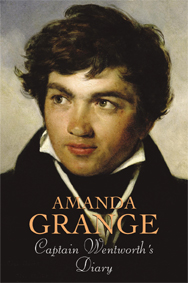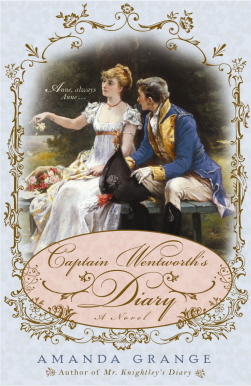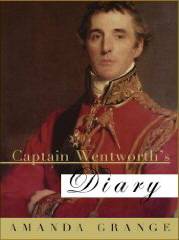Captain Wentworth's Diary



Synopsis
It is 1806, and the Napoleonic wars are ravaging Europe. Frederick Wentworth, a brilliant young man with a flourishing career in the navy, is spending his shore leave in Somerset, where he meets and falls in love with Anne Elliot. The two become engaged, but Anne's godmother persuades Anne to change her mind, leaving Wentworth to go back to sea a bitter and disappointed man.
Eight years pass, and peace is declared. Wentworth is no longer a young man with his way to make in the world, but a seasoned captain with a fortune at his disposal. He is ready to marry anyone with a little beauty who pays a few compliments to the navy - or so he says - until he sees Anne. Anne's bloom has faded, yet she has the same sensibilities and superior mind she had eight years earlier, and before he knows it, he is falling in love with her all over again.
Can there be a happy outcome for them this time around, or have they lost their chance of love forever?

REVIEWS
"Amanda Grange’s retellings of Jane Austen’s novels from the point of view of the heroes are hugely popular and deservedly so . . . her latest novel, Captain Wentworth’s Diary, a retelling of Austen’s Persuasion, will entrance and enthrall old and new fans alike." - Julie Bonello, Single Titles
"In this retelling of Jane Austen’s Persuasion, Captain Wentworth’s thoughts take centre stage, and very revealing they are too. His love, rejection, bitterness and ultimate constancy are laid bare, but never in a way that compromises the original.
Amanda Grange has taken on the challenge of reworking a much loved romance and succeeds brilliantly." -- Sara Wilson, Historical Novels Review (Cpt Wentworth's Diary is an Editor's Choice in the Nov 2007 issue of the Historical Novels Review)

Persuasion is one of my favourite books, but I have often wondered what happened the first time Anne and Wentworth met, in 1806. Where did they meet? Was it at a ball, at dinner, or on a picnic or in the village? What did they think of each other?
When I came to write Captain Wentworth's Diary, I decided to try and answer those questions by writing what is in effect a prequel to Persuasion as the first part of Captain Wentworth's Diary. I'm really looking forward to finding out what readers think of it!
Here's an extract from the prequel, in fact it's the opening section of the book.
1806
Thursday 5 June
At last I am on my way to Somerset!
Harville and I travelled from the coast together, marvelling at how strange it was to see green fields as we went along, instead of the blue sea. Apart from the ground's alarming tendency to stay still beneath us, instead of rolling and dipping like an honest element, the journey was not uncomfortable, and we managed to while away the time by regaling two governesses, the Miss Browns, with our recent adventures at sea. Or, rather, I did, for Harville said little, and it fell upon me to astonish them with tales of the dangers we had passed through in our efforts to protect them from the French. I was rewarded by their horrified gasps and grateful thanks.
As they left the coach, I rallied Harville, telling him he was a fool to exchange the smiles of a country full of women for the shackles of one, and asking him if the elder Miss Brown was not the most beautiful girl he had ever seen. He acknowledged that she was very pretty, but not as pretty as his Harriet, and he would not be dissuaded; he is still determined to ask her to marry him as soon as he gets home.
We found a comfortable berth at The Cow and Calf, and now here I am in my room, sitting by the open window, looking out over fields. I have not yet accustomed myself to the country, with its rich smell of flowers and grass. It seems strange to me after the salt tang of the sea, but I will grow used to it before long, I dare say, and I have no doubt I will soon be revelling in the joys of shore leave.
Friday 6 June
Harville and I made a good breakfast and then we parted, he to go to Wiltshire and I to go to Monkford. He left first, on the stage, and I had to wait an hour for the coach that was to carry me onwards. It arrived at the inn in a great hurry, pausing only long enough to change horses, disgorge three passengers, take up two more, myself and a young man who sat outside, and then depart at the same riotous pace. I took my place inside, being in funds, and was soon thrown about by the speed and the poor condition of the road, but as a very pretty farmer's daughter was thrown into my lap, I could not regret it. Her mother looked at me disapprovingly, but we could none of us help laughing when another pot hole sent her into my lap as well! Restraint being thus broken, we began to talk, and it soon emerged that they had a cousin at sea. The time passed quickly as we talked of battles and promotion, and it was a surprise to me when it was time for me to leave the stage.
I looked about me, to get my bearings, and found I had some distance to cover on foot, but I was glad of the exercise after spending so long confined. I passed through Uppercross, which I had expected to be larger from my brother's description, but which turned out to be merely a moderate-sized village, with yeomen's houses, a high-walled mansion, and a parsonage. I wondered if my brother lived in something similar, and hoped it was so, for although the parsonage was a small house, it had its own neat garden, with a vine and a pear tree trained round the casements.
I came at last to Monkford and found myself a subject of interest to the two dames and three little boys I passed, the latter falling into line some way behind me. I looked about me for my brother's house, and at last I asked a gentleman coming towards me where Mr Wentworth, the curate, lived. He gave me directions, and I soon found myself at the gate.
My eye ran over the house with interest. It was not as fine as the parsonage at Uppercross, being much smaller, and without a vine, but it had a good aspect, and I was in high spirits as I knocked at the door. The servant answered and told me that he was not at home, having not known exactly when to expect me, but that he could be found in the church. I left my belongings in the hall and went in search of him.
The church was a modest size, but in a good state of repair, which spoke well of its parishioners. As I went in, Edward saw me and gave me a hearty welcome. He finished his business, and then we left the church together.
As we walked back to his house along the dusty road, I told him all my news: of the ships I had sailed in and the Captains I had sailed under; of the battle of St Domingo and my promotion to Commander; and in return I listened to his tales of sermons and services, of neighbours and parishioners. I could not help laughing at the difference.
'What! One of your neighbours climbed over your wall uninvited last month? What a calamity! I do not know how you survived the excitement!'
'A pretty time you have had of it!' Edward retorted. 'Never knowing where you would be in a few hours' time, and whether you would be alive or dead. I would rather be safe in my parish with my garden and my books, my home and my church, rather than tossing about on the open sea in a flimsy wooden boat. You were always the bold one, Frederick.'
'And why not? The war has made it possible for men of ability and ambition to rise in the world, and I mean to use the opportunities it has given me to make my fortune. Ah! the limitless horizons, both at sea and on land, the battles to be fought, the prizes to be won. I will be a wealthy man soon, and I mean to own an estate before I am done.'
'And then be off again the minute you have bought it! You will never settle on land, you will find it too dull. I believe you will scarcely be able to tolerate your shore leave. I can offer you no battles, unless you wish to frighten my parishioners into listening to my sermons instead of whispering about each other's bonnets, and I can offer you no glory, save the glory of being a novelty, to be examined and talked over like a prize bull at a fair.'
'It is enough. I have had my fill of battles for the time being and I am ready for variety. A man may grow weary of the sea as well as anything else, and I will fight all the better for the change. Besides, I mean to enjoy myself whilst I am here, and to do all the things I cannot do on board ship. I mean to ride and walk and explore the countryside, and I am looking forward to meeting your neighbours. You have told me a great deal about them in your letters and I cannot wait to make their acquaintance. I hope there are some pretty girls hereabouts!'
'I have never noticed.'
'Come, now, even a curate notices a pretty face,' I said.
'If you had been plagued by every spinster from sixteen to sixty for the last twelvemonth, as I have, you would not be so eager to attract their notice. If they are not offering to arrange flowers in the church, they are baking me cakes, much to my housekeeper's annoyance. "Do they think I don't know how to bake a cake?" she asks. It is all I can do to keep her from leaving me; I have to soothe her ruffled feathers at least once a week.'
'They may bake as many cakes for me as they wish, though I wonder they do not have servants to do it for them.'
'They are most of them too poor to employ more than a maid of all work, so that most of them take their turn in the kitchen from time to time,' said Edward.
'And which of your spinsters is the prettiest, do you think?'
'If you must have it, Miss Welling is thought to be very pretty, and Miss Elliot is held to be handsome. She, though, is a baronet's daughter, and I doubt if she has ever seen the inside of a kitchen in her life. She will not pay any attention to you, Commander or no. You will be beneath her notice.'
'Ah, yes, I recollect you mentioning the Elliots. It was Sir Walter Elliot who asked you if you were a member of the Strafford Wentworths, I recollect, and cut you when you replied that you were not,' I said.
'He did not cut me, he simply remarked that he was astonished the names of the nobility were becoming so common, and then passed on.'
'Fine talk, when he is nothing more than a baronet. I have no time for such people. They do nothing useful, but give themselves airs because of the achievements of their ancestors. They are a spent force.'
'Then I pray you will tell him so, and ruin my standing in the neighbourhood,' Edward snorted.
'Never fear, the navy has not rid me of all my manners, or all my common sense, but I will take the liberty of thinking it.'
Upon asking him when I might have a chance of seeing Miss Elliot for myself, he told me that we were invited to a soirée tomorrow evening, and that Sir Walter intended to grace it with his presence.
'And has Miss Elliot any handsome sisters?'
'Two. Miss Elliot - Elizabeth - is the eldest, after which come Miss Anne and Miss Mary, though the latter is very young and is away at school.'
'And Miss Welling? Does she have any sisters?'
'An older sister, who is married, and a younger one who is not.'
'Splendid! Four handsome young ladies to meet. I believe I am going to enjoy my time here!'

Little did he know how important his meeting with Miss Anne Elliot was going to be!
Here's another extract from later in the book, in 1814. Captain Wentworth has returned to Uppercross and is thinking about his forthcoming meeting with Anne, which will be the first time he has seen her in eight years.
All too soon it was time for me to take my leave of the Musgroves. Buoyed up by an evening spent in the company of such pretty, spirited girls and their convivial family, I returned to Kellynch Hall.
s I walked up the drive, I found my thoughts straying to Anne once again, and thinking how strange it was that my brother-in-law should have rented Kellynch Hall. Of all the houses in Somersetshire, why did he have to rent that one? A place that held so many memories? And a place that would bring me into company with Anne? It was only by chance that I had not already met her, for if not for the child's fall, she would have been at the Great House and I would have passed the evening in her company.
As I remembered the past, I felt a spark of anger for her vacillating character, and an ache of bruised pride at the way she had treated me. And then I calmed myself. I knew I would have to accustom myself to seeing her, for we would often be together, and it would not do for me to let any trace of resentment show. I made up my mind not to mention the past, and I decided that I would treat her with perfect good humour, simply as a woman I once knew.
But even so, I could not help my thoughts dwelling on her as I went inside. Anne Elliot, I thought, after so many years.
Anne Elliot.